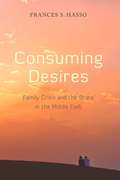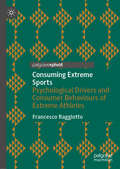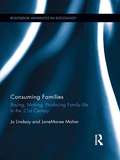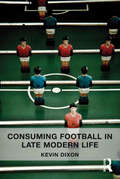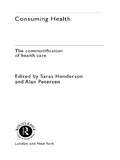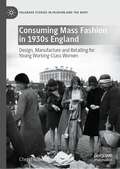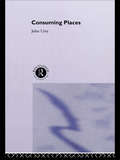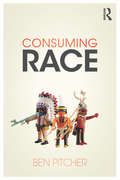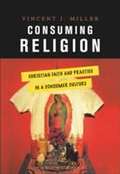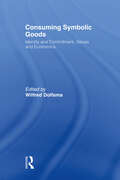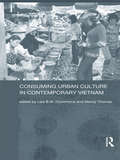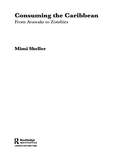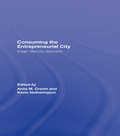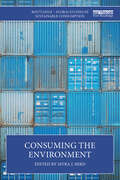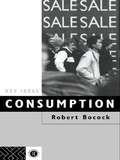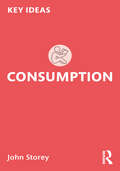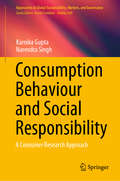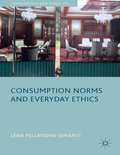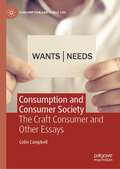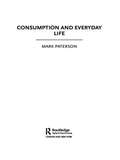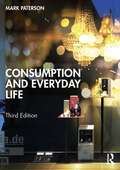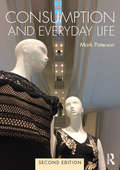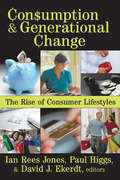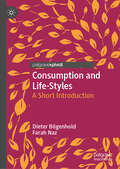- Table View
- List View
Consuming Desires: Family Crisis and the State in the Middle East
by Frances HassoOver the course of the twentieth century, most Middle East states adopted a shari'a-based system for recognizing marriages. Partly in reaction to these dynamics, new types of marriage that evade the control of the state and religious authorities have emerged. These marriages allow for men and women to engage in sexual relationships, but do not require that they register the marriage with the state, that they live together, or that the man be financially responsible for the wife or household. In Consuming Desires, Frances Hasso explores the extent to which these new relationship forms are used and to what ends, as well as the legal and cultural responses to such innovations. She outlines what is at stake for the various groups--the state, religious leaders, opposition groups, young people, men and women of different classes and locations, and feminist organizations--in arguments for and against these relationship forms.
Consuming Extreme Sports: Psychological Drivers and Consumer Behaviours of Extreme Athletes
by Francesco RaggiottoThis book explores the consumption behaviour of ‘extreme’ athletes from a quantitative perspective. Extreme sports are a multi-billion-dollar industry. The behaviour of athletes who participate in them differs from the majority of consumers in that they voluntarily seek out risky and dangerous situations that other consumers actively avoid. It has therefore been suggested that these consumer-athletes may have a unique psychology in this regard. The book adopts a novel approach based on established psychological theories concerning the behaviour of extreme individuals, applying and translating them into marketing research and practice. It discusses how specific psychological drivers impact the consumption behaviour of consumer-athletes and a variety of marketing-relevant outcomes. By demonstrating that extreme consumers are characterized by a unique psychology that leads them to act and think differently, this book offers scholars deeper insights into consumer behaviour, while also helping practitioners target this lucrative marketing segment more effectively.
Consuming Families: Buying, Making, Producing Family Life in the 21st Century (Routledge Advances in Sociology #97)
by JaneMaree Maher Jo LindsayThis book explores contemporary families as sites of consumption, examining the changing contexts of family life, where new forms of family are altering how family life is practised and produced, and addressing key social issues – childhood obesity, alchohol and drug addiction, social networking, viral marketing – that put pressure on families as the social, economic and regulatory environments of consumption change.
Consuming Football in Late Modern Life
by Kevin DixonConsuming Football in Late Modern Life explores the phenomenon of football (soccer) fandom as consumption in the age of late modernity. By centralising fandom within the sociology of consumption, the book examines how this phenomenon equates to a fluid series of consumption activities that are practiced in the course of everyday life. In turn, the work departs from much of the existing literature that features exceptional properties of fanatical fans, in order to emphasise the position that seemingly trivial acts of consumption can have a profound influence on the construction, maintenance and evolution of football fandom cultures. Containing up to date research findings derived from a programme of interviews with a sample of football fans, Kevin Dixon examines the social, emotional, economic and technological implications of consumption as fans participate in and respond to the demands of consumer life.
Consuming Health: The Commodification of Health Care
by Alan Petersen Saras HendersonIn our post-welfare society, health is increasingly viewed as a commodity and individuals are defined as 'health care consumers'. At the same time, the notion that the state should care for the health of its citizens is being replaced by an expectation that citizens should play a more active role in caring for themselves. These developments are by no means uncontentious. Consuming Health explores the diverse meanings and applications of the term 'consumer' in the field of health care and the implications for policy-making, health care delivery and experiences of health care. Contributors are well-known innovative researchers and lecturers from the Australia, the UK and Canada. Between them they cover a wide range of topics - from the medicalisation of the menopause to the participation of consumer groups in the national policy process - to create an original and thought-provoking text for students and practitioners in the field of health care.
Consuming Mass Fashion in 1930s England: Design, Manufacture and Retailing for Young Working-Class Women (Palgrave Studies in Fashion and the Body)
by Cheryl RobertsThis book details a significant and largely untold history of the demand for cheap, fashionable clothing for young working-class women. This is an interdisciplinary fashion and business history analysis that investigates the design, manufacture, retailing and consumption of fashion for and by young working-class women in 1930s Britain. It concentrates on new mass developments in the design and manufacture of lightweight day dresses styled for younger women, and on their retailing in the second-hand trade and seconds dealing, street markets, new multiple stores, department stores, independent dress shops and home dressmaking. The book also discusses the specific impact of this new product within the emerging mass manufactured goods mail order catalogue industry in England. These outlets all offered venues of consumption to the young, employed, modern working-class woman, and are analysed in the context of old and new businesses practices. The actuality of the garments worn by these young women is paramount to this research and will be at the forefront of all findings and outcomes.
Consuming Places (International Library of Sociology)
by JOHN UrryJohn Urry has been discussing and writing on these and similar questions for the past fifteen years. In Consuming Places, he gathers together his most significant contributions. Urry begins with an extensive review of the connections between society, time and space. The concept of 'society', the nature of 'locality', the significance of 'economic restructuring', and the concept of the 'rural', are examined in relationship to place. The book then considers how places have been transformed by the development of service occupations and industries. Concepts of the service class and post-industrialism are theoretically and empirically discussed. Attention is then devoted to the ways in which places are consumed. Particular attention is devoted to the visual character of such consumption and its implications for place and people. The implications for nature and the environment are also explored in depth. The changing nature of consumption, and the tensions between commodification and collective enthusiasms, are explored in the context of the changing ways in which the countryside is consumed.
Consuming Race
by Ben PitcherFrom the rise of Nordic noir to a taste for street food, from practices of natural gardening to the aesthetics of children's TV, contemporary culture is saturated with racial meanings. By consuming race we make sense of other groups and cultures, communicate our own identities, express our needs and desires, and discover new ways of thinking and being. This book explores how the meanings of race are made and remade in acts of creative consumption. Ranging across the terrain of popular culture, and finding race in some unusual and unexpected places, it offers fresh and innovative ways of thinking about the centrality of race to our lives. Consuming Race provides an accessible and highly readable overview of the latest research and a detailed reading of a diverse range of objects, sites and practices. It gives students of sociology, media and cultural studies the opportunity to make connections between academic debates and their own everyday practices of consumption.
Consuming Religion: Christian Faith And Practice In A Consumer Culture
by Vincent MillerContemporary theology, argues Miller, is silent on what is unquestionably one of the most important cultural issues it faces: consumerism or "consumer culture." While there is no shortage of expressions of concern about the corrosive effects of consumerism from the standpoint of economic justice or environmental ethics, there is a surprising paucity of theoretically sophisticated works on the topic, for consumerism, argues Miller, is not just about behavioral "excesses"; rather, it is a pervasive worldview that affects our construction as persons-what motivates us, how we relate to others, to culture, and to religion. Consuming Religion surveys almost a century of scholarly literature on consumerism and the commodification of culture and charts the ways in which religious belief and practice have been transformed by the dominant consumer culture of the West. It demonstrates the significance of this seismic cultural shift for theological method, doctrine, belief, community, and theological anthropology. Like more popular texts, the book takes a critical stand against the deleterious effects of consumerism. However, its analytical complexity provides the basis for developing more sophisticated tactics for addressing these problems.
Consuming Symbolic Goods: Identity and Commitment, Values and Economics
by Wilfred DolfsmaThe phenomenon of consumption has increasingly drawn attention from economists. While the ‘sole purpose of production is consumption’, as Adam Smith has claimed, economists have up to recently generally ignored the topic. This book brings together a range of different perspectives on the topic of consumption that will finally shed the necessary light on a largely neglected theme, such as Why is the consumption of symbolic goods different than that of goods that are not constitutive of individuals’ identity? How does the consumption of symbolic goods affect social processes and economic phenomena? Will taking consumption (of symbolic goods) seriously impact economics itself? The book discusses these issues theoretically, and, through analyses of such cases as food, religion, fashion, empirically as well. It also discusses the possible role in the future of consumption.This book was previously published as a special issue of Review of Social Economy
Consuming Urban Culture in Contemporary Vietnam
by Mandy Thomas Lisa B.W. DrummondVietnam is currently undergoing a metamorphosis from a relatively closed society with a centrally planned economy, to a rapidly urbanising one with a global outlook. These changes have been the catalyst for an exciting ferment of activity in popular culture. This volume contains contributions from scholars engaged in the most up-to-date social research in Vietnam, as well as some of Vietnam's most popular cultural producers who are forging new ways of imagining the present whilst at the same time engaging actively in reinterpreting the past. The diverse ways that Vietnam is culturally and socially negotiating the future are examined as the book addresses issues of indigenisation of cultural influences, ambivalence surrounding change, and the consistent blurring of boundaries between informal, non-state cultural activities and formal institutional structures in the evolution of a civil society in Vietnam.
Consuming the Caribbean: From Arawaks To Zombies (International Library Of Sociology Ser.)
by Mimi ShellerFrom sugar to indentured labourers, tobacco to reggae music, Europe and North America have been relentlessly consuming the Caribbean and its assets for the past five hundred years. In this fascinating book, Mimi Sheller explores this troublesome history, investigating the complex mobilities of producers and consumers, of material and cultural commodities, including: foodstuffs and stimulants - sugar, fruit, coffee and rum human bodies - slaves, indentured labourers and service workers cultural and knowledge products - texts, music, scientific collections and ethnology entire 'natures' and landscapes consumed by tourists as tropical paradise. Consuming the Caribbean demonstrates how colonial exploitation of the Caribbean led directly to contemporary forms of consumption of the region and its products. It calls into question innocent indulgence in the pleasures of thoughtless consumption and calls for a global ethics of consumer responsibility.
Consuming the Entrepreneurial City: Image, Memory, Spectacle
by Kevin Hetherington Anne CroninThis collection offers a global perspective on the changing character of cities and the increasing importance that consumer culture plays in defining their symbolic economies. Increasingly, forms of spectacle have come to shape how cities are imagined and to influence their character and the practices through which we know them - from advertising and the selling of real estate, to youth cultural consumption practices and forms of entrepreneurship, to the regeneration of urban areas under the guise of the heritage industry and the development of a WiFi landscape. Using examples of cities such as New York, Sydney, Atlantic City, Barcelona, Rio de Janeiro, Douala, Liverpool, San Juan, Berlin and Harbin this book illustrates how image and practice have become entangled in the performance of the symbolic economy. It also argues that it is not just how the urban present is being shaped in this way that is significant to the development of cities but also that a prominent feature of their development has been the spectacular imagining of the past as heritage and through regeneration. Yet the ghosts that this conjures up in practice offer us a possible form of political unsettlement and alternative ways of viewing cities that is only just beginning to be explored. Through this important collection by some of the leading analysts of consumption, cities and space Consuming the Entrepreneurial City offers a cutting edge analysis of the ways in which cities are developing and the implications this has for their future. It is essential reading for students of Urban Studies, Geography, Sociology, Cultural Studies, Heritage Studies and Anthropology.
Consuming the Environment (Routledge-SCORAI Studies in Sustainable Consumption)
by Myra J. HirdConsuming the Environment explores the environmental impacts of consuming everyday products and explains how we can consume more sustainably.Written in an accessible style, this book begins with our everyday mundane experiences of consuming products – online, in the grocery store, at the mall – and shows how these practices are connected to a global system dependent upon ever increasing consumption. Drawing on the expertise of researchers in topics such as energy, food, water, land, fashion, electronics, eco-tourism, green products, and (micro)plastics, this volume unpacks the complex and largely invisible relationships that consumerism has with resource extraction and manufacturing. By focusing on a diverse range of everyday consumer products, as well as more subtle things that have been transformed into products, such as knowledge, waste, and pets, the chapters are structured around the central argument that we must re-orient ourselves as citizens rather than consumers. It is as citizens that we may help to organize our communities and hold our governments and industry accountable to planetary sustainability boundaries.With the inclusion of summary boxes, directed discussion, assignment questions, and further reading in each chapter, this book will be an essential resource for undergraduate and postgraduate students studying courses on consumerism, sustainable consumption, and environmental sociology.
Consumption (Key Ideas)
by Robert Bocock Dr Robert BocockThis book analyzes the main post-war features of consumption. It traces the historical development of consumption and discusses the major contributions made by sociologists in discussing the subject. Robert Bocock is Senior Lecturer in Sociology at the Open University.
Consumption (Key Ideas)
by John StoreyThis book provides a clear and wide-ranging overview of consumption as a sociological concept. Arguing that consumption is both an unavoidable part of life and an ongoing dialectical process, it gives a critical assessment of a range of theoretical approaches to the study of consumption and the possibilities these frameworks can offer. Consumption is something we all do. It is not just another word for shopping. When we eat and drink, or when we read a book or watch TV, or visit an art gallery or spend an evening in a pub, we are consuming. There is not ‘a world of consumption’ that some of us do not enter. We are all consumers and consumption must be regarded as an important sociological concept as a result. Consumption is also connected to notions of ‘agency’ - what people do, rather than what is done to them or made available to them for their doings. Before the critical focus on consumption, it was assumed that the meaning and use of things was dictated by how they were produced or by their simple mute materiality. Focusing on consumption challenges this way of thinking: rather than the mute and predictable end point of production, it is rethought as an activity, a process, something we do that involves use and meaning. It is how most of us intervene in culture. This thought-provoking yet accessible book offers a valuable introduction of the concept of consumption for researchers and undergraduate and postgraduate students in a range of fields within the humanities and social sciences, including sociology, history, anthropology, English, media and cultural studies.
Consumption And Violence: Radical Protest In Cold-war West Germany
by Alexander SedlmaierCombining the tools of political, social, cultural, and intellectual history, Consumption and Violence: Radical Protest in Cold-War West Germany explores strategies of legitimization developed by advocates of militant resistance to certain manifestations of consumer capitalism. The book contributes to a more sober evaluation of West German protest movements, not just terrorism, as it refrains from emotional and moral judgments, but takes the protesters' approaches seriously, which, regarding consumer society, had a rational core. Political violence is not presented as the result of individual shortcomings, but emerges in relation to major societal changes, i. e. , the unprecedented growth of consumption. This new perspective sheds important light on violence and radical protest in post-war Germany, as previous books have failed to examine to what extent these forms of resistance should be regarded as reactions to changing regimes of provision. Continuing the recently growing interest in the interdependence of countercultures and consumer society, the focus on violence gives the argument a unique twist, making the book thought-provoking and engaging.
Consumption Behaviour and Social Responsibility: A Consumer Research Approach (Approaches to Global Sustainability, Markets, and Governance)
by Narendra Singh Karnika GuptaThis book investigates the concept of consumer social responsibility (CnSR) by considering the combination of ‘consumption behaviour’ and ‘social responsibility’. It puts forward a theory of responsible consumption behaviour, then models and empirically tests this theory using quantitative research methods. In so doing, the book offers a new consumer behaviour model: the C-A-C-B (Concern-Attitude-Commitment-Behaviour) model. The book appeals to readers interested in consumer behaviour, research methodologies, social responsibility, corporate social responsibility, segmentation and profiling, sustainability, and structural equation modelling with path analysis and confirmatory factor analysis. The book also offers concrete recommendations that will benefit businesses and governments alike.
Consumption Norms and Everyday Ethics (Consumption and Public Life)
by Léna Pellandini-SimányiHow much is acceptable to consume? What is appropriate to consume and which goods fall into the disapproved category? Answers to these questions vary widely across time and space. This book examines the sources of this variation by providing an account of how everyday consumption norms develop, why they differ and why they change.
Consumption and Consumer Society: The Craft Consumer and Other Essays (Consumption and Public Life)
by Colin CampbellThis collection of high quality, largely previously published essays, analyses a range of controversies in the field of the sociology of culture and consumption. Campbell made a major contribution to the development of this field and he has a clear and coherent theoretical position which he employs to comment on interesting disputes among scholars seeking to understand consumer culture.Containing a brand new expansive essay reflecting on consumption in the age of a pandemic and drawing out some of the conceptual and practical implications of the relationship between wants and needs, science and norms, this synthesis will be an invaluable resource for students and researchers of consumption, consumer and cultural sociology.
Consumption and Everyday Life
by Mark PatersonIntroducing all the key ideas and major theorists of consumption in a lively and engaging manner, this book draws on theories of everyday life and aspects of sociology, cultural geography and cultural studies, and presents a comprehensive exploration of the central themes in consumption and consumer culture. Readily accessible case studies describe familiar forms of consumption from areas of everyday life, grounding the debates and ideas discussed. Key topics covered include: the semiotics of branding and advertising the representation of 'nature' and the environment the relations between consumer and producer ethical consumption the tensions between local spaces of consumption and globalized markets. While each of the chapters crystallize the debate in a specific subject area, they also lie within a larger argument concerning the ethics, the poetics and the politics of consumption in everyday life, making this essential reading for undergraduates on cultural studies, sociology and cultural geography courses.
Consumption and Everyday Life
by Mark PatersonWith an emphasis on everyday life, this respected text offers a lively and perceptive account of the key theories and ideas which dominate the field of consumption and consumer culture. This third revised and expanded edition is a major update of the text of the second edition, adding new chapters on youth culture and consumption, retail psychology, gender and consumption, the globalization of food, and digital consumption and platform capitalism. Theoretical perspectives are introduced such as theories of practice, critical theory, semiotics, and psychoanalysis. Examples from film, literature, and television are used to illustrate concepts and trends in consumption, and a wide range of engaging and up-to-date case studies of consumption are employed throughout. Historical context is provided to help the reader understand how we became consumers in the first place. Written by an experienced teacher, the book offers an accessible and thought-provoking introduction to the concept of consumption for students in sociology, cultural studies, human geography, history, anthropology, and social psychology.
Consumption and Everyday Life: 2nd edition (The\new Sociology Ser.)
by Mark PatersonWith an emphasis on everyday life, this respected text offers a lively and perceptive account of the key theories and ideas which dominate the field of consumption and consumer culture. Engaging case studies describe forms of consumption familiar to the student, provide some historical context, and illustrate how a range of theoretical perspectives – from theories of practice, to semiotics, to psychoanalysis – apply. Written by an experienced teacher, the book offers a comprehensive grounding drawing on the literature in sociology, geography, cultural studies, and anthropology. This new revised and expanded edition includes more extended discussion of gender, the senses, sustainability, globalization, and the environment, as well as a brand-new chapter on the ethics of consumption.
Consumption and Generational Change: The Rise of Consumer Lifestyles
by Ian JonesThe study of consumption in social life is growing. Moving from being a relatively unimportant part of the processes of production, distribution, and exchange, questions of how people consume and to what ends now occupy center stage. Today's capitalism is exemplified by a global arena of consumption in which distance is no obstacle to distribution and ownership. Equally, social distinctions that accompanied classically "modern" forms of consumption are now more complex and fluid than classifications of "high" and "popular" culture allow.This book addresses the rise of consumer culture and the various attempts to explain and account for it. It considers the view that a particular generational framework was formed in the post-war period and has been carried on into the early twentieth century with particular consequences for the experience of later life. The rise of individualism, of mass consumption, leisure and lifestyles have been accompanied by the democratization of social forms and for many a corrosion of community and social cohesion. The text highlights how understanding is gained from examining the generational habits that developed in tandem with the rise of mass consumption.Drawing on historical perspectives and comparative studies, the book addresses social change with reference to generation effects and conflict. Having set the scene in terms of the literature on consumption, lifestyles and generational change, the volume poses key questions in relation to the transformation of later life that are addressed in turn by the contributors. This is a key volume as we enter the second decade of a new century.
Consumption and Life-Styles: A Short Introduction
by Dieter Bögenhold Farah NazThis book takes an interdisciplinary approach to the world of consumption, covering different topics and including sociological, economic and marketing aspects. The term ‘consumption’ is vague and even in academic disciplines the term is used in a variety of ways. Consumption research asks how earnings and spending are related to each other. More generally, consumption research investigates how people, social classes or societies realize their consumption practices. The question of how consistent preference structures are due to changing empirical backgrounds of time, space and related culture is frequently asked. Which context variables (historical time, geographical framework, cultural background) specify the practice of consumption and in which way do attributes such as age, gender, class, occupation and life-style have their own impacts on the way in which consumption is realised?This book will be of interest to researchers working in economics, sociology, marketing, aesthetics and design, anthropology and communication studies.
